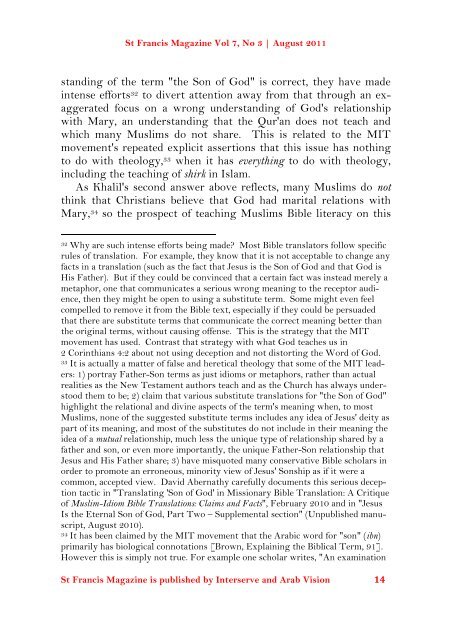Jesus, the Son of God: Biblical meaning, Muslim Understanding ...
Jesus, the Son of God: Biblical meaning, Muslim Understanding ...
Jesus, the Son of God: Biblical meaning, Muslim Understanding ...
You also want an ePaper? Increase the reach of your titles
YUMPU automatically turns print PDFs into web optimized ePapers that Google loves.
St Francis Magazine Vol 7, No 3 | August 2011!standing <strong>of</strong> <strong>the</strong> term "<strong>the</strong> <strong>Son</strong> <strong>of</strong> <strong>God</strong>" is correct, <strong>the</strong>y have madeintense efforts 32 to divert attention away from that through an exaggeratedfocus on a wrong understanding <strong>of</strong> <strong>God</strong>'s relationshipwith Mary, an understanding that <strong>the</strong> Qur'an does not teach andwhich many <strong>Muslim</strong>s do not share. This is related to <strong>the</strong> MITmovement's repeated explicit assertions that this issue has nothingto do with <strong>the</strong>ology, 33 when it has everything to do with <strong>the</strong>ology,including <strong>the</strong> teaching <strong>of</strong> shirk in Islam.As Khalil's second answer above reflects, many <strong>Muslim</strong>s do notthink that Christians believe that <strong>God</strong> had marital relations withMary, 34 so <strong>the</strong> prospect <strong>of</strong> teaching <strong>Muslim</strong>s Bible literacy on this!!!!!!!!!!!!!!!!!!!!!!!!!!!!!!!!!!!!!!!!!!!!!!!!!!!!!!!!32 Why are such intense efforts being made? Most Bible translators follow specificrules <strong>of</strong> translation. For example, <strong>the</strong>y know that it is not acceptable to change anyfacts in a translation (such as <strong>the</strong> fact that <strong>Jesus</strong> is <strong>the</strong> <strong>Son</strong> <strong>of</strong> <strong>God</strong> and that <strong>God</strong> isHis Fa<strong>the</strong>r). But if <strong>the</strong>y could be convinced that a certain fact was instead merely ametaphor, one that communicates a serious wrong <strong>meaning</strong> to <strong>the</strong> receptor audience,<strong>the</strong>n <strong>the</strong>y might be open to using a substitute term. Some might even feelcompelled to remove it from <strong>the</strong> Bible text, especially if <strong>the</strong>y could be persuadedthat <strong>the</strong>re are substitute terms that communicate <strong>the</strong> correct <strong>meaning</strong> better than<strong>the</strong> original terms, without causing <strong>of</strong>fense. This is <strong>the</strong> strategy that <strong>the</strong> MITmovement has used. Contrast that strategy with what <strong>God</strong> teaches us in2 Corinthians 4:2 about not using deception and not distorting <strong>the</strong> Word <strong>of</strong> <strong>God</strong>.33 It is actually a matter <strong>of</strong> false and heretical <strong>the</strong>ology that some <strong>of</strong> <strong>the</strong> MIT leaders:1) portray Fa<strong>the</strong>r-<strong>Son</strong> terms as just idioms or metaphors, ra<strong>the</strong>r than actualrealities as <strong>the</strong> New Testament authors teach and as <strong>the</strong> Church has always understood<strong>the</strong>m to be; 2) claim that various substitute translations for "<strong>the</strong> <strong>Son</strong> <strong>of</strong> <strong>God</strong>"highlight <strong>the</strong> relational and divine aspects <strong>of</strong> <strong>the</strong> term's <strong>meaning</strong> when, to most<strong>Muslim</strong>s, none <strong>of</strong> <strong>the</strong> suggested substitute terms includes any idea <strong>of</strong> <strong>Jesus</strong>' deity aspart <strong>of</strong> its <strong>meaning</strong>, and most <strong>of</strong> <strong>the</strong> substitutes do not include in <strong>the</strong>ir <strong>meaning</strong> <strong>the</strong>idea <strong>of</strong> a mutual relationship, much less <strong>the</strong> unique type <strong>of</strong> relationship shared by afa<strong>the</strong>r and son, or even more importantly, <strong>the</strong> unique Fa<strong>the</strong>r-<strong>Son</strong> relationship that<strong>Jesus</strong> and His Fa<strong>the</strong>r share; 3) have misquoted many conservative Bible scholars inorder to promote an erroneous, minority view <strong>of</strong> <strong>Jesus</strong>' <strong>Son</strong>ship as if it were acommon, accepted view. David Abernathy carefully documents this serious deceptiontactic in "Translating '<strong>Son</strong> <strong>of</strong> <strong>God</strong>' in Missionary Bible Translation: A Critique<strong>of</strong> <strong>Muslim</strong>-Idiom Bible Translations: Claims and Facts", February 2010 and in "<strong>Jesus</strong>Is <strong>the</strong> Eternal <strong>Son</strong> <strong>of</strong> <strong>God</strong>, Part Two – Supplemental section" (Unpublished manuscript,August 2010).34 It has been claimed by <strong>the</strong> MIT movement that <strong>the</strong> Arabic word for "son" (ibn)primarily has biological connotations [Brown, Explaining <strong>the</strong> <strong>Biblical</strong> Term, 91].However this is simply not true. For example one scholar writes, "An examinationSt Francis Magazine is published by Interserve and Arab Vision!*$!







![Reflections on Surah Fatiha and the Lord's Prayer[1] - St.Francis ...](https://img.yumpu.com/49377951/1/184x260/reflections-on-surah-fatiha-and-the-lords-prayer1-stfrancis-.jpg?quality=85)








